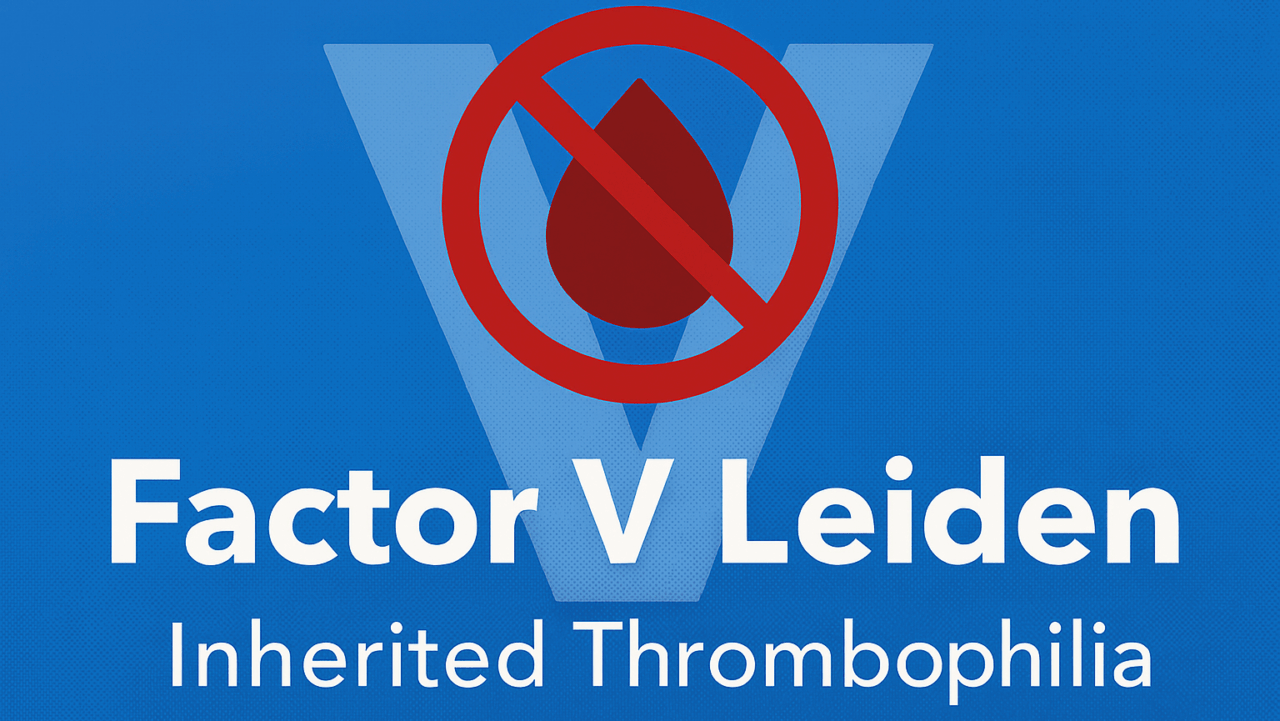
Factor V Leiden: Quick Facts
Dr. Chokri Ben Lamine, Adult Hematology and Stem Cell Transplantation Assistant Consultant at Oncology Center of Excellence at King Faisal Specialist Hospital & Research Center, shared a post on, recently shared on X:
“Factor V Leiden – Hematology Thread
Most common inherited thrombophilia
Everything you need: pathophysiology, risks, management, MCQ, OSCE
- What is Factor V Leiden?
Mutation in F5 gene (Arg506Gln) → resistance to activated protein C (APC)
Results in prolonged clotting activity → high risk of venous thromboembolism (VTE)
- Prevalence
3–8% in Caucasians
Heterozygous: ~7x higher VTE risk
Homozygous: ~20–80x higher VTE risk
Rare in Asians, Africans
- When to Suspect
Unprovoked VTE <50 yrs
Recurrent VTE
VTE in unusual sites (e.g., cerebral, mesenteric veins)
Strong family hx of clots
Neonatal purpura fulminans (if compound with protein C deficiency)
OCP or pregnancy-related clots
- Testing
Start with APC resistance assay
Confirm with DNA test for F5 mutation
Only test if results will change management (per ASH)
- Management – Acute VTE
Anticoagulate as per standard (DOACs, warfarin, LMWH)
Duration: depends on risk of recurrence
No need to treat asymptomatic heterozygotes
- Pregnancy
Heterozygous, no VTE history: no routine anticoagulation
Heterozygous + VTE history: LMWH throughout pregnancy + 6 weeks postpartum
Homozygous or compound mutation: prophylaxis recommended
- Avoid
Estrogen-based OCPs
Smoking
Prolonged immobility without prophylaxis
- Exam Pearls
Most common inherited thrombophilia
higher DVT > PE
DOACs preferred unless contraindicated
Routine screening not recommended
Counsel before OCPs, pregnancy, surgery
- MCQ
30 year old female with 1st unprovoked DVT, heterozygous FVL, no other RFs. Completed 6 mo anticoagulation. What next?
Stop anticoagulation; counsel on OCP risks and recurrence prevention
- OSCE Scenario 1
Young woman with VTE on OCP
Take history
Order FVL test if family history
Counsel on stopping estrogen, using progestin-only methods
- OSCE Scenario 2
Pregnant FVL heterozygote, no prior VTE
Explain that prophylaxis is not needed unless additional risks
Plan close monitoring, early postpartum prophylaxis if needed
- OSCE Scenario 3
Homozygous FVL patient needing surgery
Plan perioperative LMWH
Counsel on risk, early ambulation, compression devices
- Landmark References (Aug 2025)
1.NCCN 2025 – Thrombophilia & VTE risk stratification
2.ASH 2023 – Management guidelines on inherited thrombophilia
3.GeneReviews – Factor V Leiden update July 2024
4.BMJ 2022 – Risk of VTE recurrence in FVL
5.Front Cardiovasc Med 2022 – Meta-analysis on FVL and VTE recurrence.”
Stay updated on the latest with Hemostasis Today.
-
Feb 23, 2026, 18:13Fight4Hematology Supports Research and Empowers the Next Generation – ASH
-
Feb 23, 2026, 17:59Wolfgang Miesbach: Real-World Evidence of Emicizumab on Joint Outcomes in Hemophilia A
-
Feb 23, 2026, 17:56Shiny K Kajal: The Transfusion Reaction We Often Miss
-
Feb 23, 2026, 17:53Radheshyam Meher: Contributing to the Transfusion Evidence Round-Up for International Childhood Cancer Day 2026
-
Feb 23, 2026, 17:46Mahesan Subramaniam: The Physiological Impact of Anger on Immunity
-
Feb 23, 2026, 17:42Bryan Fry: First Evidence That Bothrops atrox Venom Directly Activates Human Factor VII
-
Feb 23, 2026, 17:34Bastu Odoka: Why Blood Should NOT be Left at the Bedside to ‘Warm’
-
Feb 23, 2026, 17:28Henry Burkitt: Patients Are Challenging How the Medicines Policy System Works in England
-
Feb 23, 2026, 16:50Mutaz Al‑Sabah: Interesting Webinar on FH in Women is Now Available to Watch

